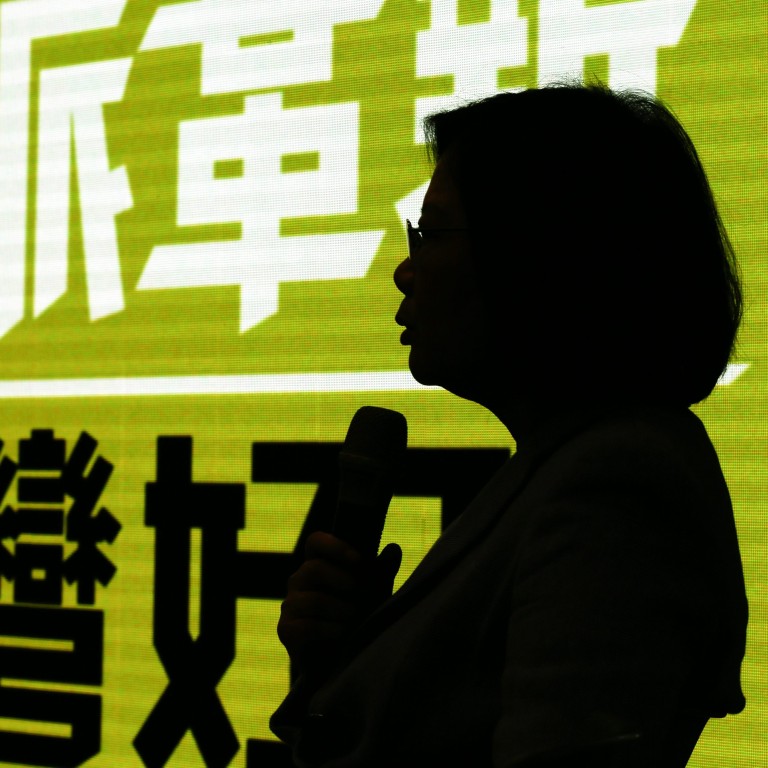
Expected next leader of Taiwan won't be boxed in by summit tactic, analysts say
Democratic Progressive Party candidate Tsai Ing-wen is likely to resist the narrower path Kuomintang chief Ma Ying-jeoum is trying to lay down
The chairwoman of Taiwan’s opposition Democratic Progressive Party, Dr Tsai Ing-wen, who is leading opinion polls to be the island’s next leader in January’s presidential election, is unlikely to be “boxed in” by pledges made by the island's incumbent President Ma Ying-jeou following his historic meeting with President Xi Jinping on Saturday .
Ma said on Thursday and at a press conference after the meeting in Singapore that a path had been opened for his successor – no matter if that person was from his Kuomintang party or the pro-independence DPP – to meet the mainland leader in future.
The opposition quickly seized upon the remark, with DPP candidate and chairwoman Tsai saying Ma was not in a position to frame Taiwan’s future, and he should not make promises that would ultimately fall to others to keep, Taiwan’s official Central News Agency reported.
“Beijing initiated the meeting [with Ma], which shows it is very nervous about the Kuomintang losing political power,” said Taiwan-based political commentator Wang Shing-ching. “Beijing has planned to set up a frame [for Ma’s successor].”
Beijing initiated the meeting [with Ma], which shows it is very nervous about the Kuomintang losing political power
The KMT is trailing in polls ahead of January’s election, after suffering a drubbing in local elections last year that saw many of its candidates – several of them household names – tossed out.
Tsai is widely expected to become the next president of the self-ruling island that Beijing regards as a renegade province.
Tsai has taken a middle road towards cross-strait relations, pledging to maintain the status quo although refusing to explicitly endorse the “one-China solution” that Beijing considers to be the bedrock of relations.
Taiwanese analysts doubt Tsai can be forced onto the narrower path Ma is trying to lay down. “Ma’s words sounded bizarre, not logical,” Wang said.
“It is good for him and Xi to meet but he has no grounds to ask other people to follow, just like Deng Xiaoping did not meet Chiang Ching-kuo [the son of Taiwan’s founder Chiang Kai-shek].”
Chiang Kai-shek met Mao Zedong in September 1945.
Hung Chi-chang, a Taiwanese politician and former chairman of the Straits Exchange Foundation, said such top-level summits required careful nurturing and mutual trust, which still did not exist between the Communist Party and the DPP.
“Currently, it’s difficult to see this meeting turning into a regular practice as there hasn’t been any effective communication between the DPP and the Communist Party,” Hung said.
“The Xi-Ma meeting is [an achievement] for the Kuomintang and the Communist Party, not two governments.”
Any meeting between Xi and Tsai would require the Taiwanese side to recognise the one-China principle agreed in the 1992 consensus, which the DPP has refused to accept.
“Ma’s attitude is to challenge Tsai. She will be the one to blame if there are no more such meetings in the future,” said senior researcher Xu Shiquan of the Chinese Academy of Social Science’s Institute of Taiwan Studies.
“She won’t be able to maintain the status quo if she doesn’t change her stance.”
Nevertheless, Tsai has said she would leave open the possibility of meeting the mainland side if she won the election, as long as the discussions adhered to the principles of “openness, transparency, equal status and respect”.
Paul Lin, a Taiwanese politician and former colleague of Tsai, said she was a rational leader whose main priority was to improve the island’s economy.
“She well understands that Taiwan’s economy relies heavily on the mainland, therefore she absolutely won’t raise the issue of Taiwan independence,” Lin said.
“If there are to be such talks, the DPP’s principle will be ‘no politics, just the economy’.”
